23 Benefits Of Cantaloupe, Nutritional Value, And Recipes
Relish this natural hydration booster to make the most of its rich nutrient content.
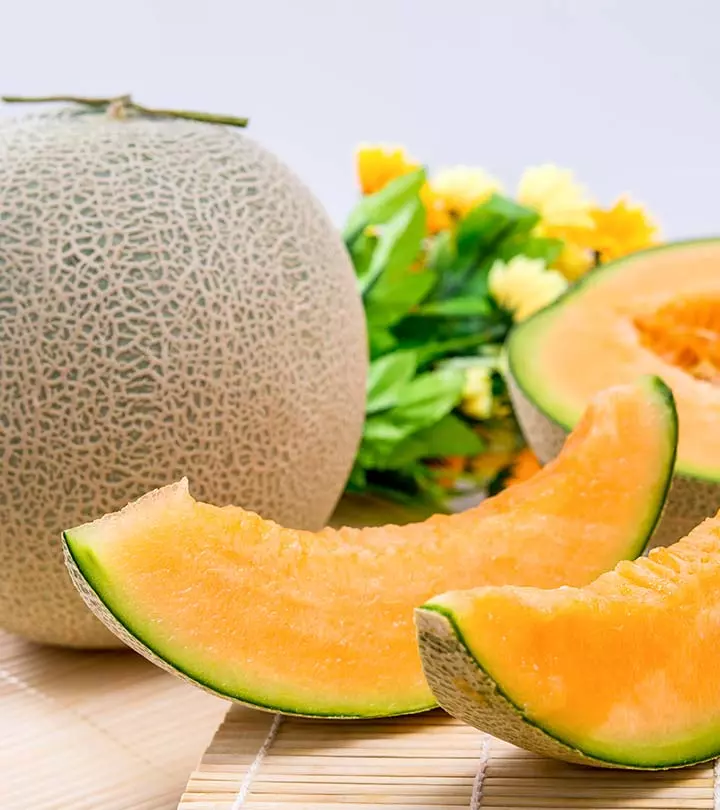
Image: shutterstock
Summers and lush water-rich fruits almost go hand in hand! Nature gives us these hydrating fruits to balance the heat of the summer season. Cantaloupe is one such fruit that is abundantly found and relished in summers! Otherwise known as muskmelon, this juicy pulpy fruit has a mildly sweet taste that is delicious and hydrating at the same time! It becomes all the more flavorful once its fully ripened, suitable to be eaten raw or added in to smoothies and salads! But then, there’s more to cantaloupe benefits than just its nutrient rich hydrating nature! Read on to know more!

 Know Your Ingredient: Cantaloupe
Know Your Ingredient: CantaloupeWhat Is It?
A light yellow fruit with an orange inside that has a sweet taste and musky aroma.
What Are Its Benefits?
It strengthens the immune system, combats hair loss, and supports heart and eye health.
Who Can Consume It?
Anyone can consume it except people with bowel issues and kidney disease.
How Often?
You can consume 1 cup of cantaloupes daily.
Caution
Excess consumption may cause diarrhea and stomach cramps.
In This Article
What Is Cantaloupe?
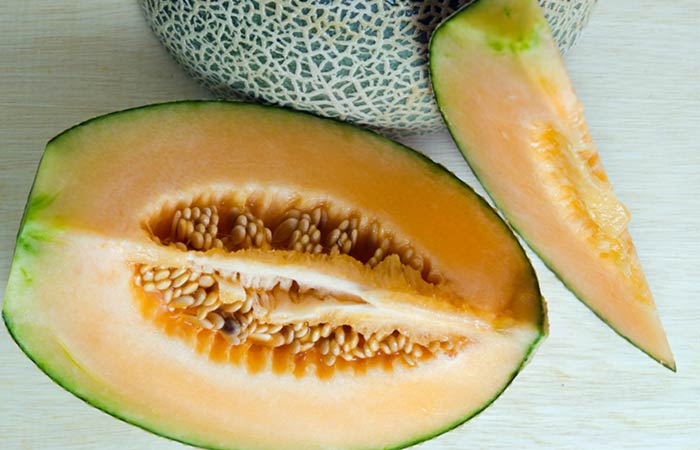
Scientific Name—Cucumis melo var. Cantalupensis
Family—Cucurbitaceae
Native—Persia
Other Names—Muskmelon, Rock melon, Sweet melon, Persian melon, Kharbuja (Hindi), Alshamam (Arabic), Kænṭalūp (Sinhala) and Cantalupo (Spanish)
Cantaloupe is a type of melon belonging to the Cucurbitaceae family which also includes fruits and vegetables like squash, pumpkin, cucumber, gourd, etc. This fruit is light yellow to orange in color, sometimes with a deeper salmon hue and like other melons it also grows on the ground surface as a trailing vine.
Cantaloupe is an alkaline fruit with many benefits. The common alkaline fruit benefits include relieving acidity and aiding digestion. This fruit provides hydration to the body and fights inflammation. It has a round or oblong shape, a soft consistency, and a juicy texture with a sweet, musky aroma, best found in completely ripe fruits. The hollow cavity in the center contains small off-white colored seeds. Cantaloupes are primarily summer fruits and are best in the months of April to August. Is cantaloupe good for you? Yes, it is indeed a very healthy addition to your diet.
 Trivia
TriviaKey Takeaways
- This light yellow or sometimes orange fruit is delicious with bonus health advantages.
- It protects and hydrates the skin with potassium content and also combats free radical damage.
- It is also very good for strengthening the immune system.
- It helps fight against hair loss; you can also use it as a conditioner.
Types of Cantaloupes
Several varieties of cantaloupe fruits are grown all over the world. But generally, two common varieties of melons are popular in the western countries, depending on their place of origin.
- North American Cantaloupe (Cucumis melo reticulatus): This type is popular in the United States and has been named reticulatus due to its net-like (reticulated) skin. These melons have a sweet characteristic pale green succulent flesh.
- European Cantaloupe (Cucumis melo cantalupensis): This cantaloupe gets its name from the Italian papal village of Cantalup and is characterized by lightly ribbed pale green skin that is quite different from its North American counterpart. Galia melon and charentais also belong to this category.
Trivia-Made out of 90 percent water, a cup of cantaloupes carry only 60 calories. Now, that’s what we call a fruit that is tasty, sugary and healthy! So, now we know how many calories in cantaloupe.
Benefits Of Cantaloupe

Cantaloupes not only appeases the taste buds, but also offer a wide range of health benefits. Here’s a look at the various cantaloupe health benefits.
Health Benefits
- Strengthens The Immune System
- Cardiovascular Health
- Prevents Cancer
- Combats Stress
- Eye Health
- Prevents Diabetic Nephropathy
- Beneficial For Lungs
- Treatment Of Insomnia
- Aid The Treatment Of Menstrual Problems
- Aids In Weight Loss
- Quit Smoking Sans Withdrawal Symptoms
- Beneficial For Pregnant Women
- Medicinal Property Of Cantaloupe Seeds
- Alleviate Toothache
- Medicinal Value Of Cantaloupe Tea
- Aid The Treatment Of Arthritis
- Promotes Digestion
Skin Benefits
- Hydrates And Rejuvenates Skin
- Skin Regeneration
- Anti-Ageing Benefits
- Treatment Of Eczema And Other Skin Problems
Hair Benefits
Health Benefits Of Cantaloupe

Apart from their delicious sweet taste and enticing aroma, cantaloupe melons are excellent sources of minerals, pro-Vitamin A, potassium and dietary fiber, thus providing several health benefits.
1. Strengthens The Immune System
Consuming cantaloupes on a regular basis can help improve and strengh the immune system, making it easier for the body to fight diseases.
Why Does It Work
Cantaloupe is rich in Vitamin C and Vitamin A which boosts immunity by stimulating the white blood cells in the body. WBCs are considered as the body’s natural defense mechanism as they prevent foreign bodies from attacking as well as eradicating infections that attack the body (1). Being a powerful antioxidant, Vitamin C also effectively combats free radicals in the body. These free radicals damage the skin and are responsible for causing premature aging. Adding cantaloupes to your diet can keep premature aging at bay.
2. Cardiovascular Health
Cardiac related issues are quite common these days. Why not try cantaloupes to keep your heart healthy?
Why Does It Work
These melons are rich in potassium which controls blood pressure, thus boosting your heart health. This mineral also prevents hypertensioni High blood pressure caused by increased pressure exerted by the blood on the arteries and may lead to a stroke or a heart attack. and prevents sodium from further harming the body (2). Cantaloupes are also rich in a compound called adenosine which is beneficial for the heart as it has blood thinning properties. This prevents blood clotting in the cardiovascular system. Vitamin C prevents arteriosclerosisi The thickening or hardening of the arterial walls due to fat or cholesterol buildup restricting blood flow. i.e. hardening of arteries while folate helps in preventing heart attacks.
3. Prevents Cancer
The very name cancer is phobic as it could turn fatal anytime. The least we can do is have foods that can prevent the deadly disease. One such food is cantaloupe.
Why Does It Work
The high content of Vitamin C and beta-carotene in cantaloupes make them a great food for cancer prevention, as they can effectively fight and eliminate free radicals from the body. These free radicals are harmful as they attack the body cells and cause cancerous growth (3).
4. Combats Stress
Deadlines at the office, rushing kids to school, making breakfast for the husband, dropping mom to Yoga class…such hectic lifestyle can only lead to stress. Next time you feel that way, take a break and have a glass of cantaloupe juice. You should feel better in minutes.
Why Does It Work
Cantaloupe is rich in potassium which normalizes the heartbeat and promotes the supply of oxygen to the brain, thus making you feel more relaxed and focused. It also has superoxide dismutase which combats stress by lowering the blood pressure and relaxing the nerves. It prevents cellular death caused due to oxidative stress (4).
5. Eye Health
Who wants to wear the ugly spectacles or irritating lens when you can have a good eyesight naturally? Try cantaloupe.
Why Does It Work
Cantaloupe is rich in beta carotenes which help in maintaining healthy eyesight. On absorption by the body, these beta carotenes get converted into Vitamin A which helps in preventing cataracti A progressive condition that causes the eye lens to turn cloudy, causing blurry vision and eventual blindness. and improving vision (5). Studies have proved that regular consumption of foods with high vitamin content can reduce the risk of developing cataracts by 40%.
6. Prevents Diabetic Nephropathy
Diabetic nephropathy is a kidney disorder in which the kidney cells get dangerously damaged.
Why Does It Work
Cantaloupe extract known as “oxykine” can prevent this condition (6). Moreover, cantaloupe has a low glycemic index (GI) which means that fructose and glucose contained in cantaloupe is a simple sugar. Thus, this fruit is safe for diabetic patients and those suffering from obesity.
7. Beneficial For Lungs
Did you know cantaloupes are one of the best fruits for your lungs?
Why Does It Work
Regular intake of this melon replenishes the body from the loss of vitamin A over a period due to continuous smoking or exposure to second-hand smoke. This helps in rejuvenating the lungs and is particularly beneficial for smokers whose lungs have been severely damaged due to smoking (7).
8. Treatment Of Insomnia
All the home remedies have failed to give you a sound sleep? Try cantaloupe.
Why Does It Work
Cantaloupe has powerful laxative properties as it contains a uniquecompound that relieves the nerves and calms anxieties. Thus, it helps insomniacs to get rid of their sleeping disorders by soothing their nervous system (8).
9. Aid The Treatment Of Menstrual Problems
The menstrual cycle is one of the most dreaded times for women. If you are one of those battling cramps, then cantaloupe can help.
Why Does It Work
Vitamin C in cantaloupes is effective in regulating menstrual flow and relieving menstrual cramps in women. Regular consumption of cantaloupe during menstruation can reduce the flow and clotting considerably, It can help in the improvement of other menstrual problems. Cantaloupe is also sometimes used to induce menstruation (9).
10. Aids In Weight Loss
Cantaloupe aids in weight loss as it is low in calories and high in fiber. Thus, you can eat lots of cantaloupes while keeping your caloric intake under control.
Why Does It Work
Fiber is beneficial for weight loss as it takes a long time to leave your stomach and enter the digestive tract, thus making you feel full for a longer time (10). This slow digesting process prevents you from overeating. Besides, fiber-rich foods are often bulky and occupy more space in your stomach, making you feel fuller and preventing you from snacking in between meals.
11. Quit Smoking sans withdrawal symptoms
Want to kick the butt but can’t do it for fear of withdrawal symptoms? Try cantaloupe.
Why Does It Work
Cantaloupe is beneficial for those who are trying to quit smoking. This is because the minerals and nutrients in cantaloupe help the smoker to deal with nicotine withdrawal symptoms effectively. Moreover, it helps the body to recover faster by replenishing the lost vitamin A of the body due to constant smoking (10).
12. Beneficial For Pregnant Women
Thinking cantaloupe during pregnancy is a safe option or not? Well, cantaloupe is like an elixir for pregnant ladies.
Why Does It Work
Folic acid is often recommended for women who are trying to conceive as well as for those who are pregnant (11). The high folate content in cantaloupe helps in the production and maintenance of new cells, especially in pregnant women and it also prevents neutral tube disorders in fetuses. Cantaloupe also prevents water retention by regularly flushing out the extra sodium from the body.
13. Medicinal Property Of Cantaloupe Seeds
Eating crushed cantaloupe seeds can help to expel intestinal worms. They are also effective in treating cough, fever, and indigestion (12).
14. Alleviates Toothache
Cantaloupe rind is useful in treating toothache. Take about 6 grams of cantaloupe skin, add water and simmer till cooked. On cooling, strain and use it as a mouth rinse (13).
15. Medicinal Value Of Cantaloupe Tea
Cantaloupe root is used to make cantaloupe tea which is an effective diuretici Substances or medicines that eliminate excess fluid from our body by signaling our kidneys to produce more sodium in our urine. and helps induce vomiting (14).
16. Aids The Treatment Of Arthritis
Adding a proper dose of cantaloupe to your diet can help you kill the pain and discomfort associated with arthritis.
Why Does It Work
Cantaloupe carries anti-inflammatory properties that can prevent oxidative stress in your joints and bones, thus reducing inflammation (15)
17. Promotes Digestion
Cantaloupes are perfect for your stomach giving it a cool and calming effect. It regulates bowel movements and enhances digestive health.
Why Does It Work
This miraculous fruit is full of essential dietary fiber that helps in regulating proper bowel movements. It also ensures a good and smooth flow of food in your digestive tract, thus reducing the risk of colorectal cancer (16).
Skin Benefits Of Cantaloupe

All varieties of melons are great for the skin, and cantaloupe melon being the most nutritious among them, is no exception. It offers the following benefits for your skin.
18. Hydrates And Rejuvenates Skin
Just like our body, the watery fruit is gold for our skin too. It keeps our skin hydrated, refreshing, and happy, thus promoting healthy skin.
Why Does It Work
Cantaloupe is a vitamins-rich fruit that contains Vitamins K and E which play a major role in keeping your skin healthy and radiant. The high water content hydrates your skin from within. Cantaloupe is also a good source of B vitamins, choline, and betaine which keep your skin replenished and rejuvenated. Topical application of cantaloupe juice helps in softening and hydrating your skin (18).
19. Skin Regeneration
Do you want to look young and fresh all the time? Cantaloupe can make that happen.
Why Does It Work
The high content of Vitamins A and C in cantaloupe fruit makes it beneficial for your skin. Vitamin A encourages skin regeneration while Vitamin C is involved in the formation of collagen, the connective tissue that imparts a youthful glow to your skin (17).
How To Use
You can prepare a face pack by processing some cantaloupe in a blender and adding powdered oatmeal and yogurt to the pulp to make a thick and smooth paste. Apply this pack all over your face and neck. Remove the paste by massaging it in gentle circular movements. Wash off with warm water. This should be applied thrice a week for best results.
20. Anti-Aging Benefits
Cantaloupe can take you back to your teens again! Try cantaloupe salad and get back your youthful looking skin!
Why Does It Work
Cantaloupe has abundant folic acid which facilitates regeneration of cells, thus making your skin healthy. This is particularly beneficial for pregnant women. Vitamin C, on the other hand, prevents damage by free radicals (18). In this way, cantaloupe keeps wrinkles at bay, maintains skin elasticity and facilitates collagen synthesis, thus providing anti-aging benefits .
21. Treatment Of Eczema And Other Skin Problems
The cantaloupe juice is also an effective lotion for treating eczema and removing freckles. It can also be used as a first aid for burns and abrasions (21).
Hair Benefits Of Cantaloupe

Cantaloupe contains all the vital nutrients and minerals that are required for maintaining healthy hair and scalp. Its benefits for hair are given below.
22. Combats Hair Loss
Tired of losing a handful of hair daily? A diet with cantaloupe can battle the issue.
Why Does It Work
Inositol is a form of Vitamin B which is required to prevent hair loss and promote hair growth. This vitamin is mostly found in citrus fruits except for lemons. Cantaloupe contains sufficient amount of inositol (19).Regular consumption of this fruit can stimulate hair growth .
23. Perfect Conditioner
Cantaloupe can be a perfect hair conditioner during the summer months (23). All you need to do is mash a cup cantaloupe with a fork and massage your hair with this pulp after shampooing. Wash off after 10 minutes.
A Word Of Caution
You will be surprised to know that researching for this particular section was a sheer waste of time because cantaloupe carries not a single side-effect. Amazing isn’t it! They are rarely known to cause any allergy.
 Quick Tip
Quick TipThis summertime fruit tastes absolutely delightful when fully ripe. That’s why you must check carefully and pick only the ripe fruit to enjoy its flavorful taste. Check the next section to understand how to pick the best cantaloupe.
How To Choose Cantaloupe
Here is a guide to picking the perfect cantaloupe:
- Pick a cantaloupe with a golden or yellowish color. Green spots on the skin indicate that the fruit is not yet ripe.
- The cantaloupe’s surface should be free of major bruises, blemishes, or cuts.
- Smell the cantaloupe’s stem. A ripe cantaloupe has a sweet, fruit aroma. So, if there is no smell, it may not be ripe.
- Avoid buying soft and refrigerated cantaloupes as cool temperatures may affect the fruit’s taste and texture.
Along with picking the best cantaloupe, it is also important to store them well to maintain their freshness and flavor. Scroll down to find out more.
How To Store Cantaloupe?
If you have a whole cantaloupe that is not yet ripe, simply leave it on the counter at room temperature. It should ripen in a few days. Once that happens, you can either use it immediately or store it in the refrigerator. It can stay fresh in the refrigerator for about 5-7 days. If you cut and refrigerate the cantaloupe, it should last for about 3-5 days. You can store it in the freezer to make it last longer for up to 12 months. However, the texture of frozen cantaloupe may become slightly mushy upon thawing, making it better suited for smoothies or desserts.
Once the cantaloupe is properly stored to retain its freshness, it is time to prepare it for a delicious and refreshing treat. Scroll down to know more.
How To Prepare Cantaloupe?
- Wash the cantaloupe under running water to get rid of bacteria and debris.
- Cut the cantaloupe in half using a sharp knife.
- Using a spoon, remove the seeds and discard them.
- Slice or cube the flesh as per your preference.
- You can serve it chilled with a drizzle of lemon juice or add it in various recipes such as salads, soups, stews, and more.
- You can also make pasta or spaghetti sauce, gazpacho, and salsa with it.
- You can also include it in some baking recipes.
Picking the right cantaloupe can impart a beautiful flavor to your dishes. Check out the next section for some easy and delicious cantaloupe recipes.
Recipes Using Cantaloupes
Hey, we are not going to conclude this article without mentioning some yummy recipes using cantaloupes. So here we are with two awesome recipes.
1. Cantaloupe Ice Pops

Let’s begin this list with our favorite ice pops that are just best for the blazing summers.
Preparation Time: 5-10 minutes
Freezing Time: 12 hours
Servings: 4
What You Need
- Diced cantaloupes (3 cups)
- 1 Lime
How To Make
Blend all the ingredients for thirty seconds. Just make sure the mix is all smooth and pureed. Pour it into popsicle molds and freeze for 12 hours and enjoy the chilled and yummy popsicles.
2. Cantaloupe Smoothie

Now, let’s enjoy the smoothie recipe.
Preparation Time: 5-10 minutes
Servings: 2
What You Need
- one cup cantaloupe (diced)
- one cup yogurt
- 20 ice cubes
- Sugar to taste
- half a teaspoon fresh ginger (grated)
How To Make
Add all the ingredients to the blender and blend until smooth. Serve in an attractive glass and enjoy the chilled drink in hot summer!
 Trivia
TriviaNow you know what is cantaloupe good for and in how many ways you can relish this juicy fruit. Now, let’s talk about cantaloupe nutritional information.
Cantaloupe Nutrition Facts
The various cantaloupe benefits for health can be attributed to its rich nutritional value comprising Vitamins A, B, C and minerals like magnesium, sodium, and potassium. Moreover, it has zero cholesterol and high-level Vitamin B complex such as B1 (thiamine), B3 (niacin), B5 (pantothenic acid) and B6 (pyridoxine). Check out nutritional value of cantaloupe here.
| Cantaloupe (Cucumis melo), Fresh, Nutritive Value per 100 g (Source: USDA National Nutrient data base) | ||
|---|---|---|
| Principle | Nutrient Value | Percentage of RDA |
| Energy | 34 Kcal | 1.5% |
| Carbohydrates | 8.6 g | 6.5% |
| Protein | 0.84 g | 1.5% |
| Total Fat | 0.19 g | |
| Cholesterol | 0 mg | 0% |
| Dietary Fiber | 0.9 g | 2.25% |
| Vitamins | ||
| Folates | 21 µg | 5% |
| Niacin | 0.734 mg | 4.5% |
| Pantothenic acid | 0.105 mg | 2% |
| Pyridoxine | 0.072 mg | 5.5% |
| Riboflavin | 0.026 mg | 2% |
| Thiamin | 0.017 mg | 1% |
| Vitamin A | 3382 IU | 112% |
| Vitamin C | 36.7 mg | 61% |
| Vitamin E | 0.05 mg | 0.5% |
| Vitamin K | 2.5 mcg | 2% |
| Electrolytes | ||
| Sodium | 1 mg | 0% |
| Potassium | 267 mg | 6% |
| Minerals | ||
| Calcium | 9 mg | 1% |
| Copper | 41 µg | 4.5% |
| Iron | 0.21 mg | 2.5% |
| Magnesium | 12 mg | 3% |
| Manganese | 0.041 mg | 2% |
| Zinc | 0.18 mg | 1.5% |
| Phyto-nutrients | ||
| Carotene-alpha | 2025 µg | — |
| Crypto-xanthin-beta | 1 µg | — |
| Lutein-zeaxanthin | 26 µg | — |
- Vitamin A: Beta-carotene, an orange pigment is a primary source of Vitamin A in cantaloupe. A cup of balled cantaloupe provides 5986 international units (IU) of this vitamin which is more than the recommended daily intake for adult men and women.
- Vitamin C: Fresh cantaloupe is a rich source of Vitamin C or ascorbic acid. This essential water-soluble vitamin plays an important role in the growth and repair of tissues within the body and is also an antioxidant that blocks the action of free radicals. A cup of balled cantaloupe provides 65 mg of Vitamin C which is equivalent to 87% and 72% of the recommended daily allowance (RDA) for men and women respectively.
- Potassium: Cantaloupe has a high content of potassium which is an electrolyte, a mineral that conducts electricity within the body together with other minerals like sodium, calcium, and magnesium. Thus, it is an essential mineral needed for almost all the processes within the human body. A cup of balled cantaloupe fruit provides 463 mg of potassium which is about 10% of the daily requirement.
- Carotenoids: Carotenoids are yellow, orange and reddish pigments synthesized by plants. These pigments impart yellow or orange color to cantaloupes. They reduce the risk of cardiovascular diseases and certain cancers. Two carotenoids, lutein, and zeaxanthin, are vital for proper functioning and vision of the eyes.
- Folate: Cantaloupe is a good source of folate, an important water-soluble B vitamin micronutrient, required for the healthy growth and maintenance of cells within the body and helps prevent anemia.
- Myoiositol: Cantaloupe contains a lipid called myoinositol which prevents anxiety, insomnia, and hardening of the arteries.
Infographic: Amazing Health Benefits Of Cantaloupe
Cantaloupe is a tasty, hydrating fruit with a rich nutritional profile. It is available in different types and offers many health benefits. While we have covered all the benefits of cantaloupe in this article, we have listed a few of the more important ones in the infographic below. Take a look.
Some thing wrong with infographic shortcode. please verify shortcode syntax
Cantaloupe is a type of summer melon with a sweet taste and musky aroma. Rich in vitamins, minerals, and dietary fiber, cantaloupes are not only good for your heart, eye, bones, skin, and hair health but also help combat stress and insomnia as well. With their high folate content, they are also beneficial for pregnant women. Not only are these healthy and nutritious but don’t have a single established side-effect yet. Smoothies, soups, salads, gravies, or ice pops, you can include cantaloupes in your diet plan in several versatile ways.
Frequently Asked Questions
Is it good to eat cantaloupe every day?
Yes. It is good to eat cantaloupe every day. The wide variety of vitamins and minerals and carotenoids in cantaloupe may help treat many ailments.
Which is healthier: cantaloupe or watermelon?
Cantaloupe is healthier than watermelon. The common watermelon juice benefits are lowering blood pressure levels, managing body weight, and aiding digestion. Cantaloupe juice does all that and more. It contains immune-boosting vitamin C and other antioxidants that improve overall health.
When should you not eat cantaloupe?
Avoid eating cantaloupe if it is unripe. Set it aside for a few more days to let it ripen.
Does cantaloupe burn belly fat?
Cantaloupe doesn’t help burn belly fat. However, it may help you get leaner by reducing your energy intake.
Should cantaloupe be kept in the fridge?
Yes. Cantaloupe should be kept in the fridge.
Is it OK to eat cantaloupe at night?
Yes. It is OK to eat cantaloupe at night. It is an excellent late-night snack and also satisfies a sweet tooth.
Illustration: Benefits Of Cantaloupe, Nutritional Value, And Recipes
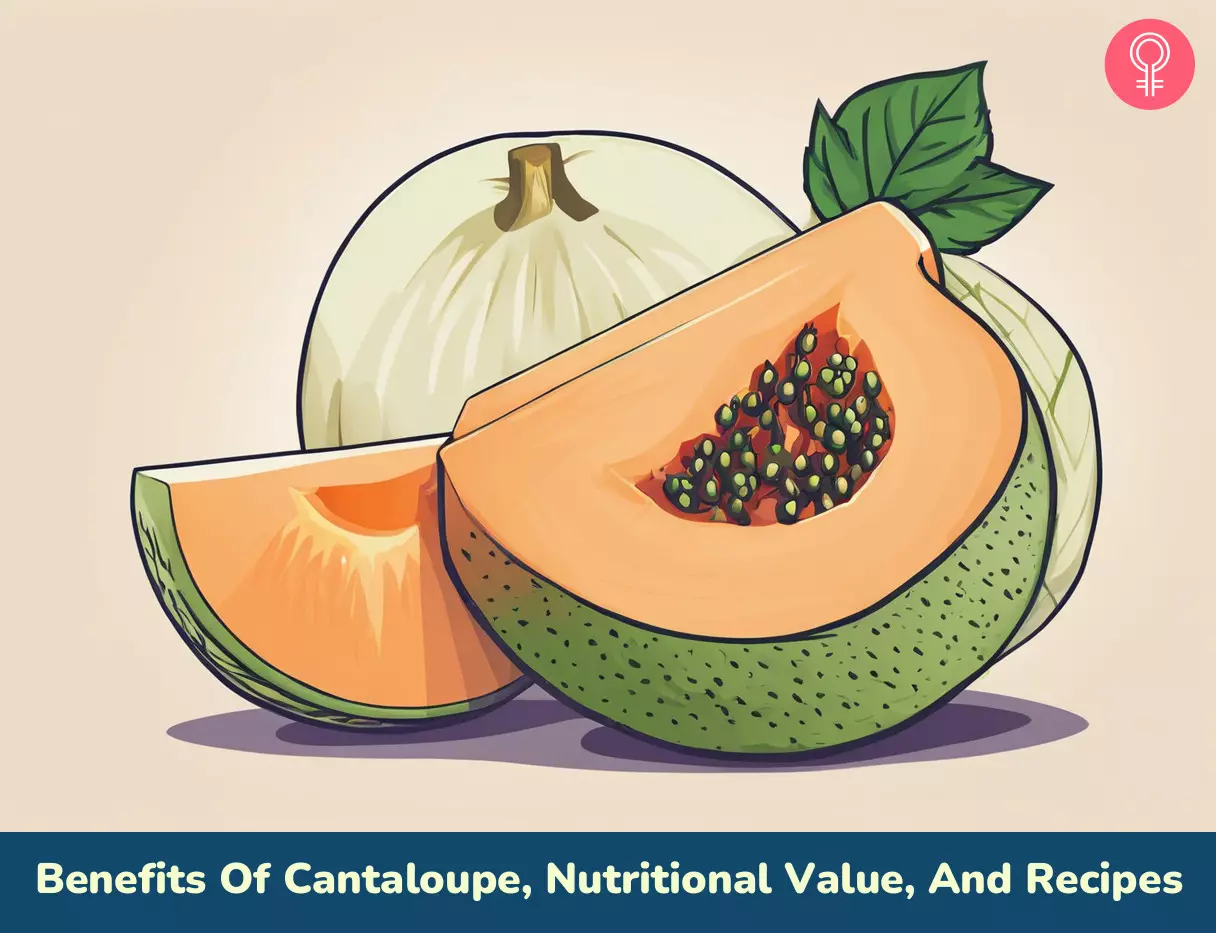
Image: Stable Diffusion/StyleCraze Design Team
Discover the amazing health benefits of cantaloupe! Learn how this delicious fruit can help improve your health and well-being. Watch this video to know more!
References
Articles on StyleCraze are backed by verified information from peer-reviewed and academic research papers, reputed organizations, research institutions, and medical associations to ensure accuracy and relevance. Read our editorial policy to learn more.
- Vitamin A and Carotenoids
https://ods.od.nih.gov/factsheets/VitaminA-HealthProfessional/ - Why Your Mother Was Right: How Potassium Intake Reduces Blood Pressure
https://www.ncbi.nlm.nih.gov/pmc/articles/PMC4530669/ - Health-Promoting Components of Fruits and Vegetables in the Diet1,2
https://www.ncbi.nlm.nih.gov/pmc/articles/PMC3650511/ - The Applications and Mechanisms of Superoxide Dismutase in Medicine, Food, and Cosmetics
https://www.ncbi.nlm.nih.gov/pmc/articles/PMC10525108/ - β-Carotene and Other Carotenoids
https://www.ncbi.nlm.nih.gov/books/NBK225469/ - Reduction of diabetes-induced renal oxidative stress by a cantaloupe melon extract/gliadin biopolymers, oxykine, in mice https://pubmed.ncbi.nlm.nih.gov/16179750/
- Intakes of Fruit, Vegetables, and Specific Botanical Groups in Relation to Lung Cancer Risk in the NIH-AARP Diet and Health Study
https://www.ncbi.nlm.nih.gov/pmc/articles/PMC2631557/ - Multivariate Analysis of Amino Acids and Health Beneficial Properties of Cantaloupe Varieties Grown in Six Locations in the United States
https://www.ncbi.nlm.nih.gov/pmc/articles/PMC7570236/ - High Fiber Diet
https://www.ncbi.nlm.nih.gov/books/NBK559033/ - For smokers who are not ready to quit
https://ebccp.cancercontrol.cancer.gov/uploads/RTIPS/WHE/DoHHS/NIH/NCI/DCCPS/2040.pdf - Maternal Dietary Patterns and Their Association with Pregnancy Outcomes
https://www.ncbi.nlm.nih.gov/pmc/articles/PMC6355947/ - A potential of some medicinal plants as an antiulcer agents
https://www.ncbi.nlm.nih.gov/pmc/articles/PMC3249913/ - Recent Advances in Momordica charantia: Functional Components and Biological Activities
https://www.ncbi.nlm.nih.gov/pmc/articles/PMC5751158/ - REVIEW ON CUCUMIS MELO: ETHNOBOTANY AND UNANI MEDICINE
https://www.researchgate.net/publication/328129787_REVIEW_ON_CUCUMIS_MELO_ETHNOBOTANY_AND_UNANI_MEDICINE - In vivo anti-inflammatory activity and UPLC-MS/MS profiling of the peels and pulps of Cucumis melo var. cantalupensis and Cucumis melo var. reticulatus
https://pubmed.ncbi.nlm.nih.gov/30857984/ - A DASH dietary pattern and the risk of colorectal cancer in Canadian adults
https://www.ncbi.nlm.nih.gov/pmc/articles/PMC4939457/ - Vitamin C (Ascorbic Acid)
https://www.ncbi.nlm.nih.gov/books/NBK499877/ - Vitamin C in Disease Prevention and Cure: An Overview
https://www.ncbi.nlm.nih.gov/pmc/articles/PMC3783921/ - Myo-inositol for insulin resistance, metabolic syndrome, polycystic ovary syndrome and gestational diabetes
https://www.ncbi.nlm.nih.gov/pmc/articles/PMC8896029/
Read full bio of Thais Tisatto
Read full bio of Tanya Choudhary
Read full bio of Ravi Teja Tadimalla
Read full bio of Moksha Gandhi





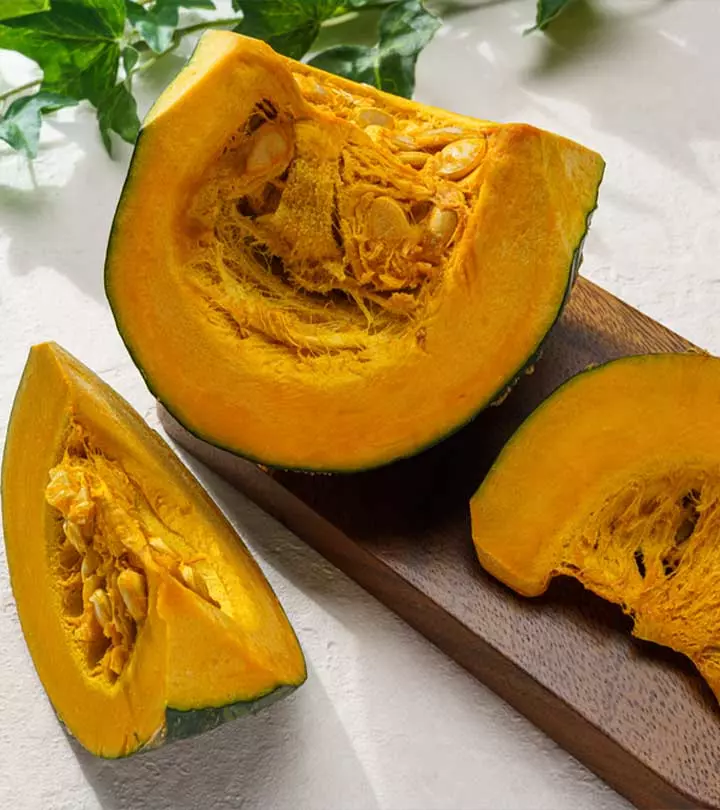
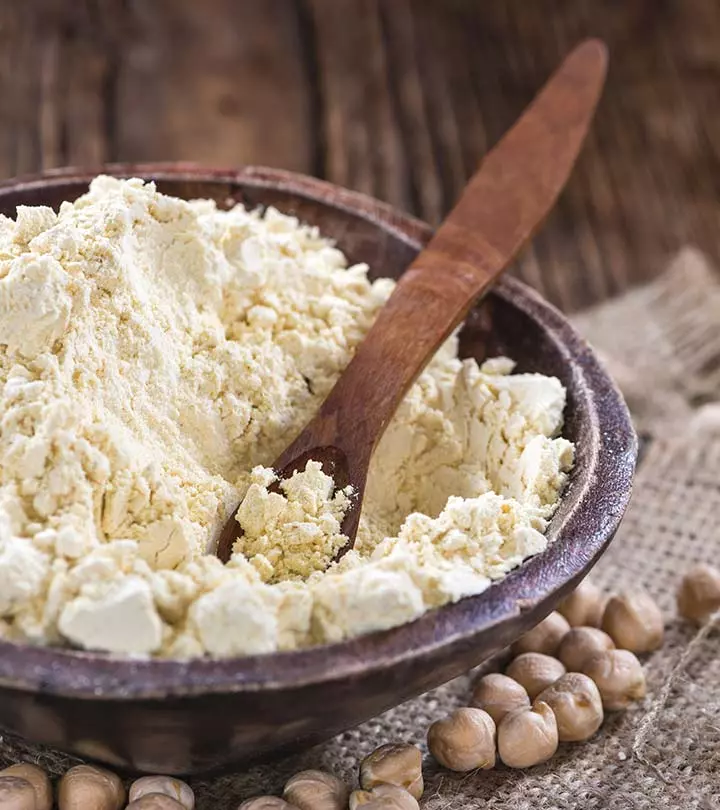
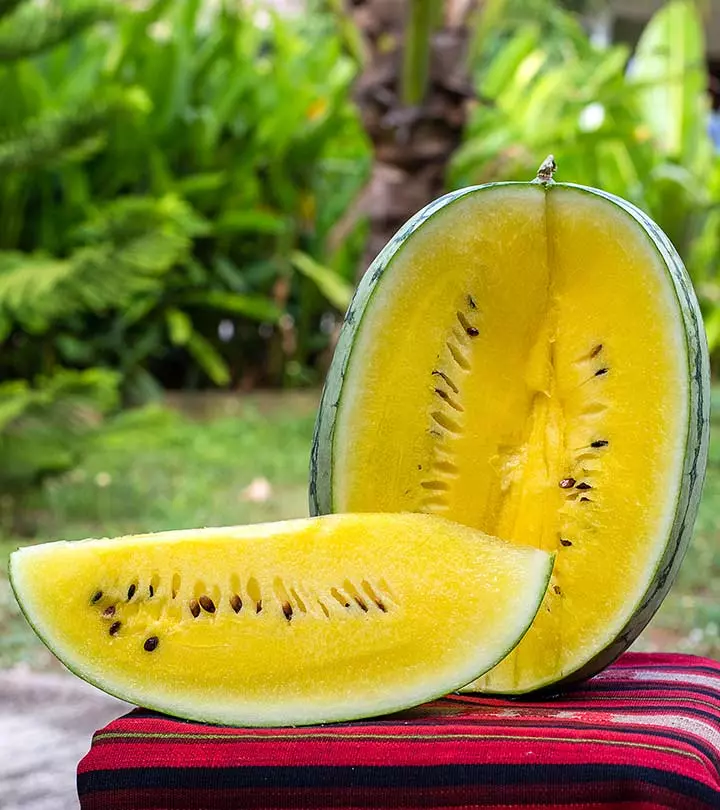
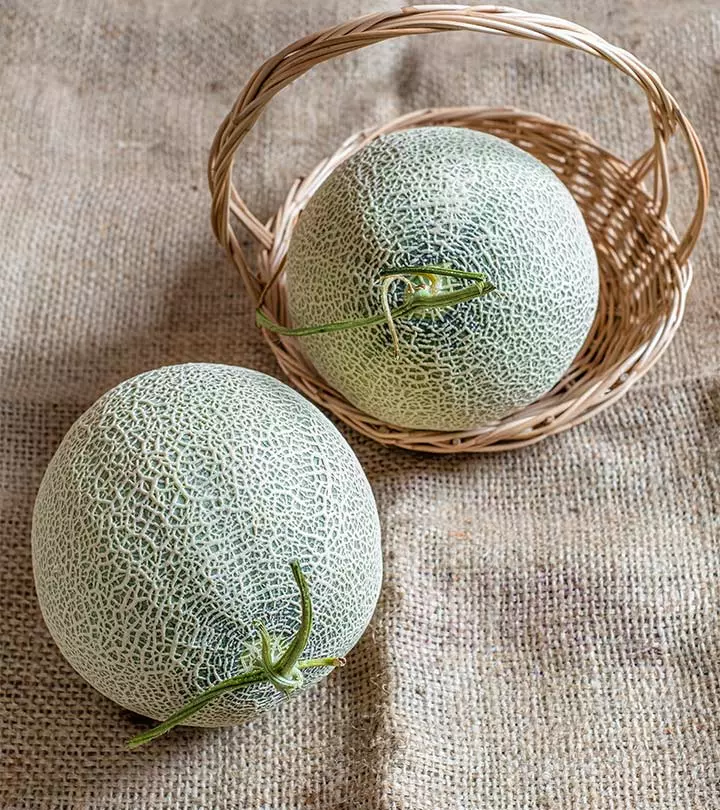



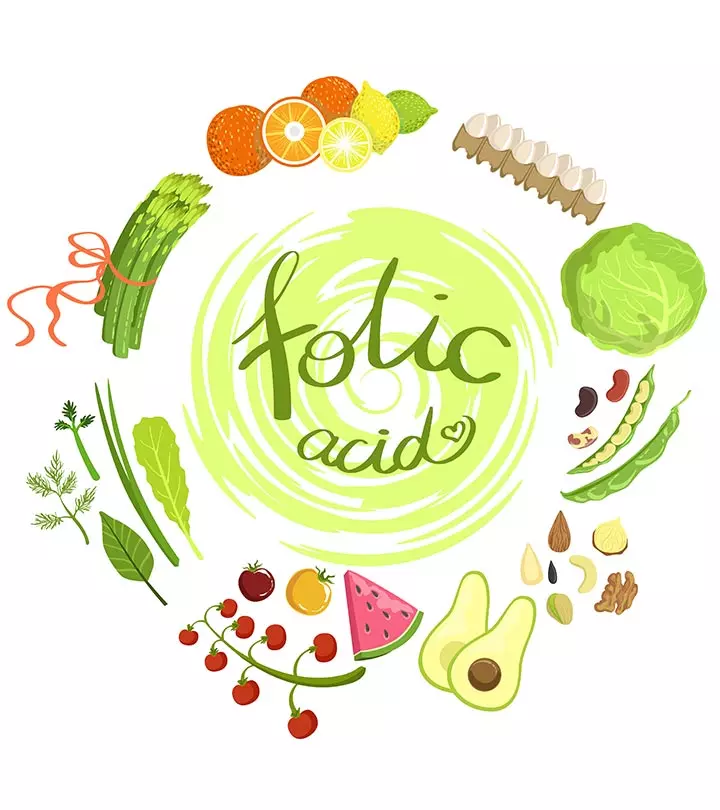

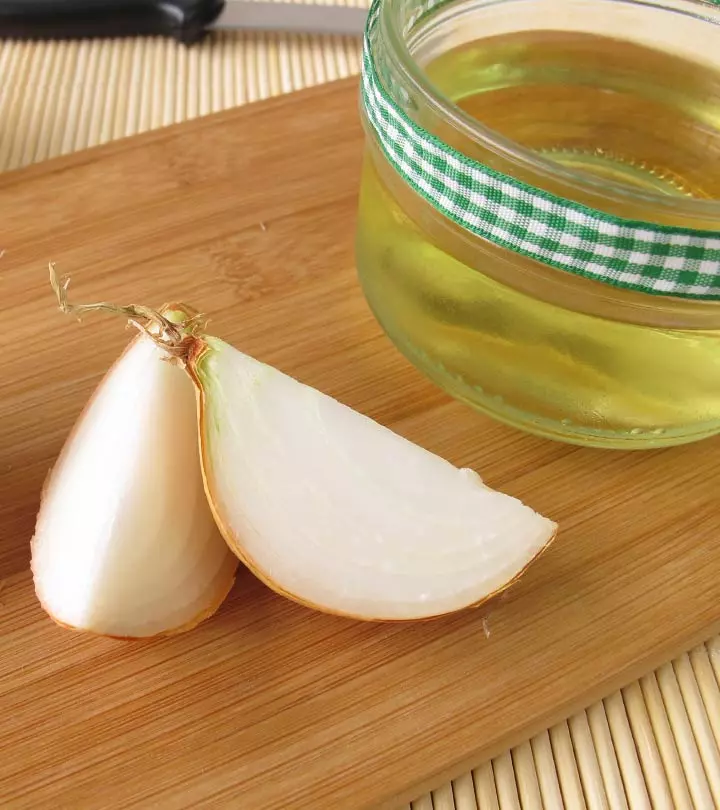
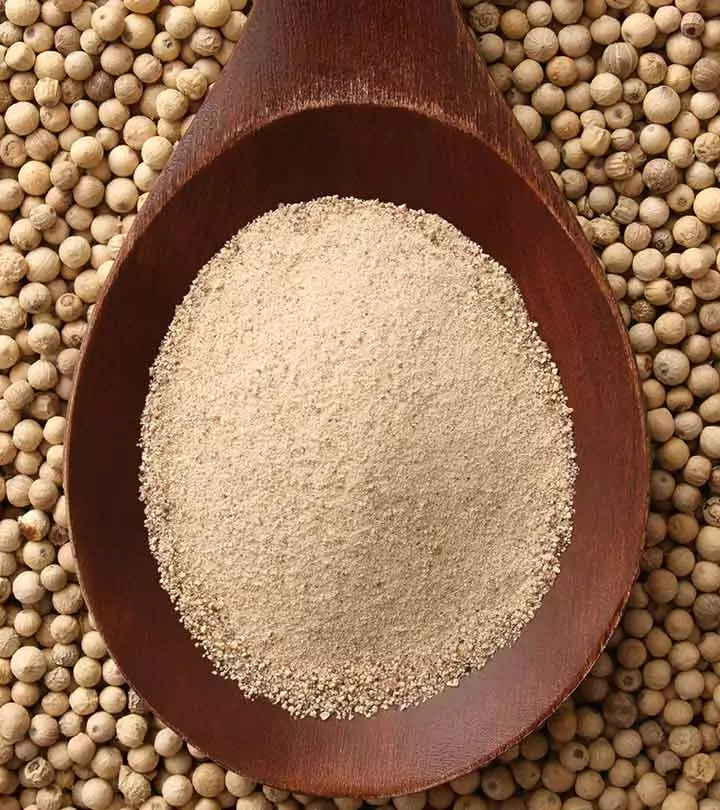

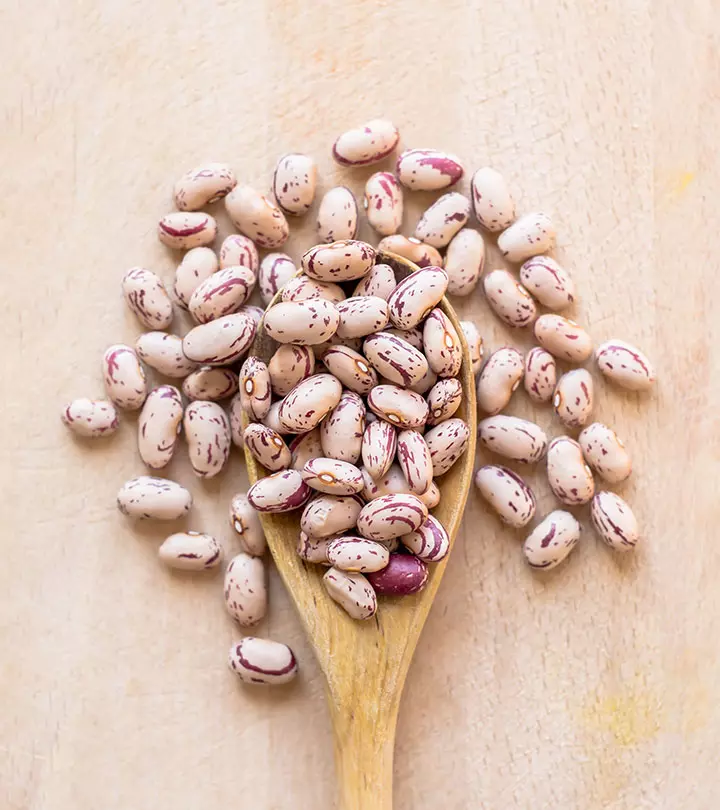
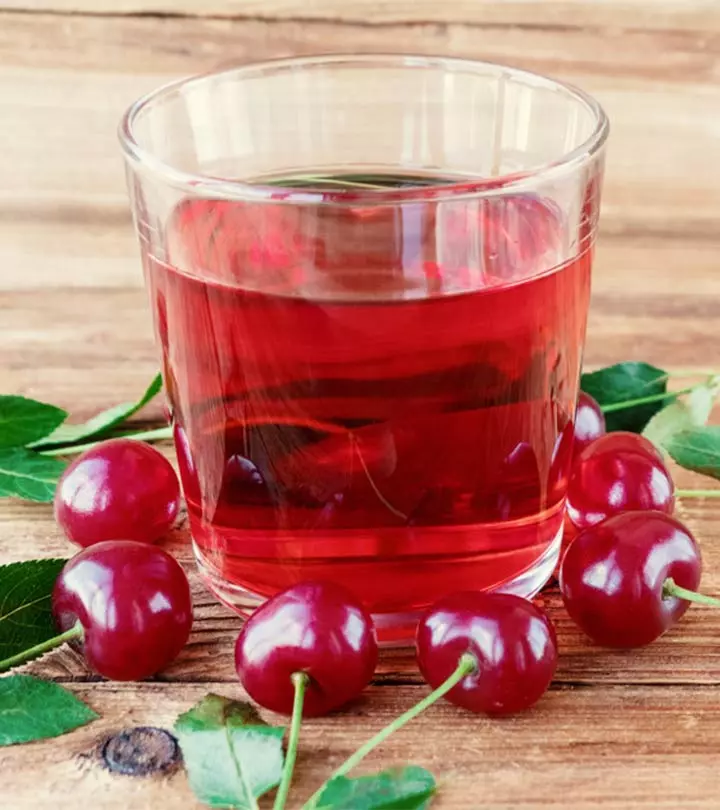
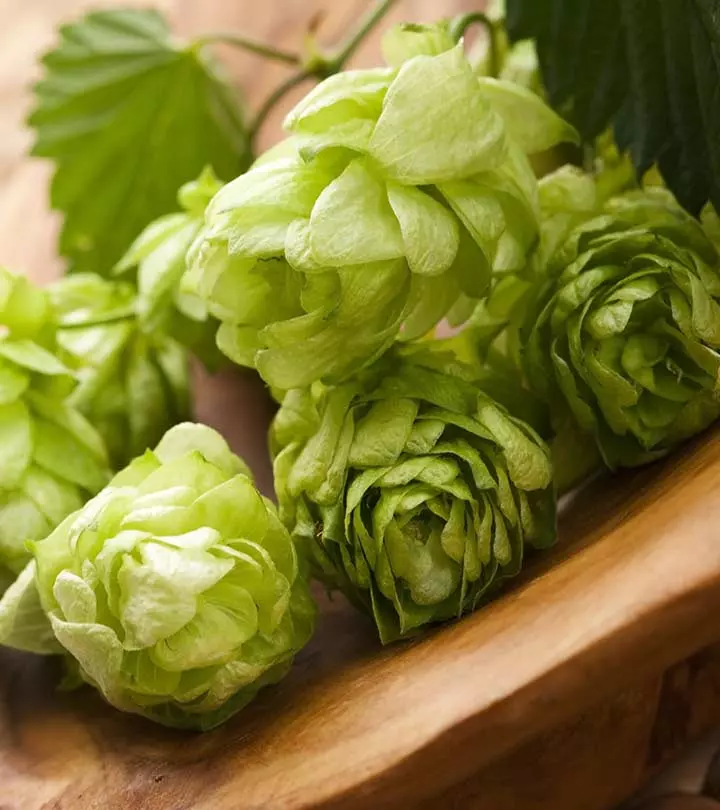
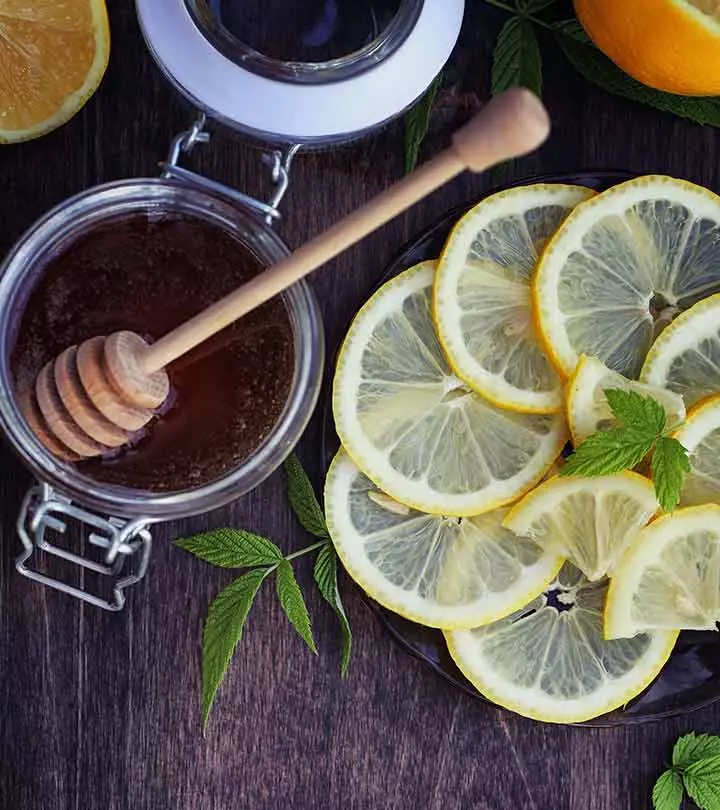
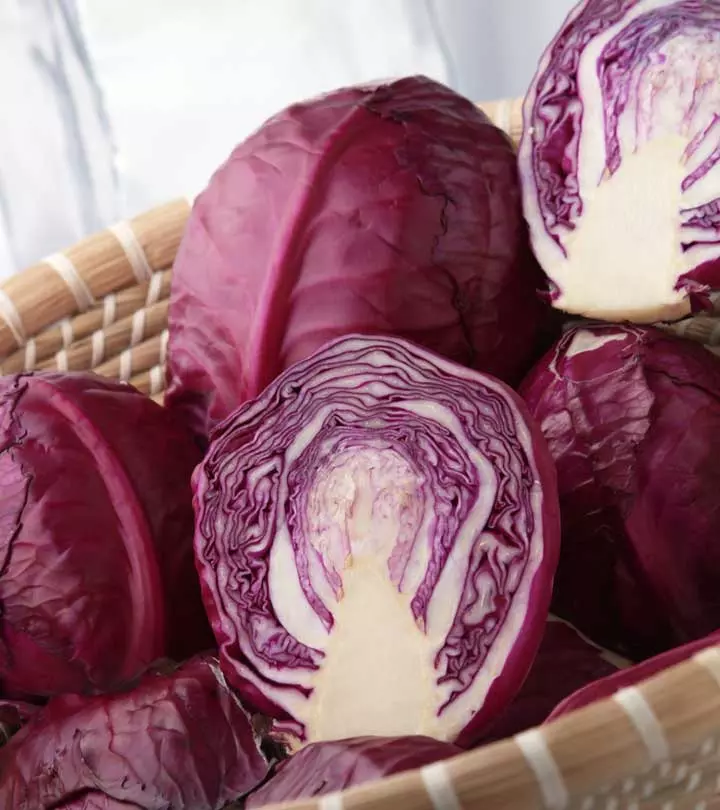


Community Experiences
Join the conversation and become a part of our empowering community! Share your stories, experiences, and insights to connect with other beauty, lifestyle, and health enthusiasts.